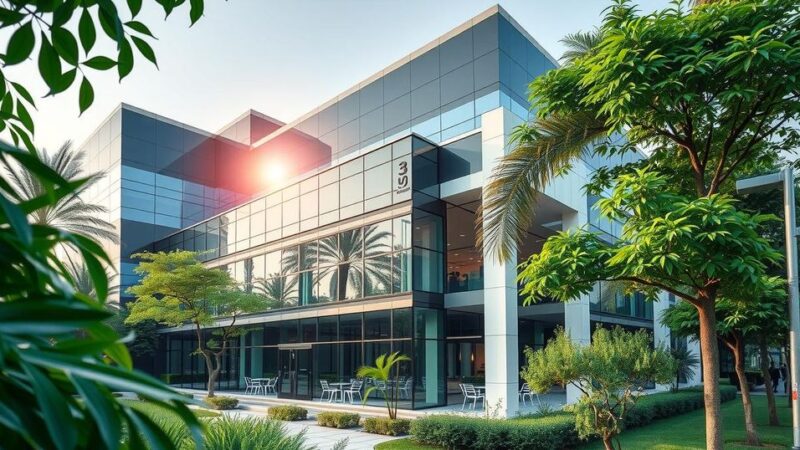Columbia University and the IICA are spearheading a new narrative to highlight the critical value of agriculture in Latin America amidst global challenges. Experts from various sectors convened to discuss the roadmap for strengthening agri-food systems, addressing food security, environmental sustainability, and energy security. The initiative aims to connect agriculture with biodiversity preservation and foster greater awareness about the sector’s contributions to societal well-being and economic development.
Columbia University and the Inter-American Institute for Cooperation on Agriculture (IICA) have embarked on a collaborative initiative aimed at formulating a new narrative that underscores the significance of agriculture in Latin America, particularly in light of the pressing global challenges anticipated over the next three decades. A distinguished assembly of experts from various sectors—including public, private, and academia—gathered at Columbia University in New York to deliberate on the creation of a strategic roadmap. This roadmap encompasses critical themes such as food and nutritional security, environmental sustainability, and energy security. The overarching objective is to fortify the agri-food systems within the region, enabling them to serve as effective solutions in a context marked by population growth, geopolitical tensions, and climate crises. The discourse, which occurred at Columbia University’s Forum—a platform recognized for shaping international public dialogue—featured notable figures including Guyana’s President Mohammed Irfaan Ali, IICA Director General Manuel Otero, Columbia’s Climate School Interim Dean Jeffrey Shaman, and NASA’s Cynthia Rosenzweig. Key participants also included Ismahane Elouafi from CGIAR, Marfrig’s Paulo Pianez Junior, Rubén Echeverría from the Gates Foundation, David Milestone of the Tony Blair Institute for Global Change, Joao Francisco Adrien Fernandes from Itaú Bank, Marcelo Brito from the Amazon Initiative Consortium, along with Columbia researchers Walter Baethgen and Glenn Denning. The discussions were coordinated by Izabella Teixeira, a former Brazilian Minister of Environment and Special Advisor to IICA for significant global events such as G20 and COP. This initiative reflects a shared commitment by Columbia University and IICA to establish a realistic perspective regarding Latin America’s role as a global provider of food and ecosystem services, leveraging its rich natural resource base and innovative institutional frameworks. It emphasizes the necessity of addressing the interconnections among agriculture, climate change, and biodiversity loss, necessitating a new narrative that encourages efficient resource use, diminishes greenhouse gas emissions, fosters resilience, and enhances productivity. Titled “Creating a new narrative for agriculture in Latin America. Resource-efficient agri-food systems for the health of people and the planet,” the session coincided with significant events such as the United Nations General Assembly and Climate Week in New York. Discussion outcomes included preliminary guidelines for a document reflecting the alliance between Columbia University and IICA, intended to illuminate the agriculture sector’s contributions to food security and environmental equilibrium. President Irfaan Ali articulated the necessity of transcending traditional agricultural paradigms to integrate production and biodiversity preservation within the narrative, highlighting the critical roles of youth and women in this sector that significantly influences societal well-being and national economic development. Director General Manuel Otero concurred, stating, “an outdated narrative still survives that does not reflect the reality of rural areas in Latin America and is characterized by depicting a commodity-based, extractive, and very primary agriculture, where quantity is more important than quality.” His perspective further emphasized the importance of connecting producers with consumers, advocating for a comprehensive vision that addresses the societal dimensions of agriculture. The roadmap’s construction will necessitate engagement with governments, industries, and civil society across pivotal global forums for political and environmental discussions. A significant forthcoming milestone includes the United Nations Climate Change Conference (COP 29) scheduled for November in Azerbaijan, where IICA will operate a pavilion dedicated to showcasing the realities of agriculture in the region, with COP 30 slated to take place in Brazil next year. Moreover, Teixeira discussed the ongoing dialogue aimed at identifying collective challenges faced by Latin American nations, notably in the contexts of climate and nature crises, alongside emerging non-tariff barriers tied to environmental issues in international trade. She asserted that the new narrative should bridge knowledge gaps regarding the harmonious relationship between production and environmental sustainability, highlighting Latin America’s indispensable agricultural role amid international instability and discussions surrounding land use, deforestation, and ecosystem restoration. Academic insights were shared, with researcher Walter Baethgen stressing the importance of audience awareness—”When we build a new narrative, the question is, who are we talking to?”—highlighting the gaps in urban understanding of agriculture’s significance, reinforcing the monumental task of constructing and disseminating this new agricultural narrative to a broader audience. The collaborative consensus established the pivotal role of science and innovation in responding to contemporary challenges in trade and consumer preferences concerning healthful food options, while also recognizing urgent issues stemming from changing dietary habits, health requirements, migration pressures due to climate change, and armed conflicts.
Agriculture in Latin America holds substantial potential to address growing global challenges, including food security, climate change, and biodiversity conservation. As the global population continues to expand, the region’s agricultural systems must evolve to provide sustainable solutions in the face of political instability and environmental crises. Columbia University and IICA’s joint initiative aims to revamp the existing narrative surrounding Latin American agriculture to reflect its strategic importance in a rapidly changing world. By engaging various stakeholders, including government, industry, and civil society, the initiative seeks to highlight the interconnectedness of agriculture, ecological security, and socioeconomic health in the region, thereby fostering a more sustainable and resilient future for agriculture and its contributions to global stability.
In conclusion, the collaborative efforts between Columbia University and IICA aim to redefine the narrative of agriculture in Latin America, emphasizing its multifaceted role in ensuring food security, ecological balance, and social stability. The initiative highlights the urgency for a transformative approach that acknowledges the interrelationship between agricultural production and environmental stewardship. As the roadmap for this new narrative is developed, it is crucial to engage with stakeholders across the spectrum, allowing for a comprehensive understanding of the agriculture sector’s vital contributions amid significant global challenges, including climate change and international trade barriers.
Original Source: caribbeannewsservice.com






